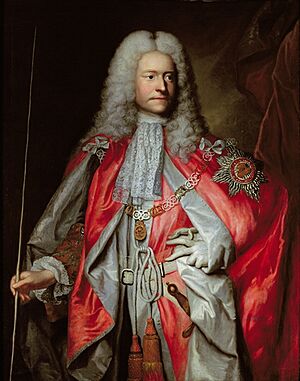Paul Methuen (diplomat) facts for kids
Sir Paul Methuen (born around 1672 – died April 11, 1757) was an important English diplomat and politician. He was a member of the Whig political party. Methuen served in the British Parliament, known as the House of Commons, from 1708 to 1747. He also worked as an envoy, or special representative, to Portugal for many years. Later, he held several important jobs in the Royal household.
Contents
Early Life and Education
Paul Methuen was born in Bradford-on-Avon, a town in Wiltshire, England. His father was John Methuen, who was also a diplomat. His mother was Mary Cheevers. Paul's parents separated when he was a teenager. He received private lessons and also attended a Jesuit school in Paris, France.
Becoming a Diplomat
Paul Methuen moved to Lisbon, Portugal, in 1691. His father had been appointed as a minister there. This gave Paul a great chance to learn about diplomacy. He earned the respect of King Pedro of Portugal.
Early Diplomatic Roles
When his father was away, Paul took over as the chargé d'affaires. This meant he was in charge of the diplomatic mission. In 1697, his father became the Lord Chancellor of Ireland. Paul then became the official Minister to Portugal.
Important Treaties and Alliances
In 1701, Paul could not stop Portugal from forming an alliance with France. However, when his father returned to Portugal in 1702, they worked together. They successfully broke the alliance between Portugal and France in 1703. This led to the famous Methuen Treaty. This treaty was a trade agreement between England and Portugal. It gave Britain a special advantage in trade with Portugal for much of the 1700s.
Paul's father stayed in Portugal as the ambassador. In 1705, Paul served with the army. He was present when Gibraltar was captured. He then returned to England to get military supplies. He was appointed Minister to Savoy. But in July 1706, his father passed away. Paul then took over his father's role as ambassador to Portugal.
Paul Methuen's Political Career
Paul Methuen was still abroad when he was chosen as a Member of Parliament (MP) for Devizes in 1708. He was a member of the Whig party.
Serving in Parliament
He worked on several committees in Parliament. One committee in 1709 worked on a bill to stop French wines and other products from entering England. This showed his interest in trade, based on his experience negotiating trade agreements. In 1709, he also supported allowing people from Palatine to become British citizens.
In November 1709, he was appointed as a Lord of the Admiralty. This meant he helped manage the navy. He was re-elected without opposition in the next election. In 1710, he was initially elected for Devizes again. However, his opponents were later declared the winners. He asked to leave the Admiralty board because he felt he was not suitable for the job. He also turned down another public office.
Later Political Roles
In the 1713 election, he was elected as MP for Brackley. But he lost his seat in April 1714 after a challenge. He was then appointed as a Lord of the Treasury. This meant he helped manage the government's money. He also became a Privy Councillor in October 1714. This is a group of advisors to the King.
In the 1715 election, Methuen was re-elected for Brackley without opposition. In 1715, he was sent as ambassador to Spain and Morocco. His goal was to negotiate a trade treaty. But he had to return due to poor health. In 1716, he became Secretary of State for the Southern Department. This was a very important government job. He resigned from this role in 1717.
When Robert Walpole returned to office in 1720, Methuen became Comptroller of the Royal Household. This job involved managing the royal household. He seems to have sold his family's estate at Bishops Cannings in 1720. He was re-elected for Brackley in 1722. In 1725, he changed jobs to become Treasurer of the Household. This was another important role in the royal household. King George I made him a Knight of the Bath in May 1725.
He continued to be elected as MP for Brackley in the elections of 1727, 1734, and 1741. However, after his supporter, the Duke of Bridgwater, died, he was not put forward for Brackley in the 1747 election.
Later Life and Legacy
Sir Paul Methuen never married. He passed away in 1757. He was buried in Westminster Abbey, a famous church in London, near his father. His only brother, Henry, had died in a fight in Lisbon in 1694.
His cousin, Paul Methuen, inherited his property. Sir Paul had bought Corsham Court for this cousin. Later, this cousin's grandson was given the title of Baron Methuen.
A statue of Sir Paul Methuen, made by Peter Scheemakers, is located at Corsham Court. This is the family home in Wiltshire.
The town of Methuen, Massachusetts, in the United States, was named after him.


